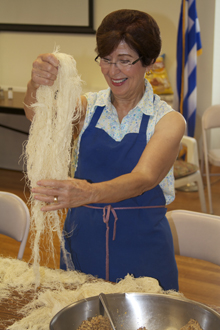
THEY BUNDLE THIS KATAIFI DOUGH . . . Into glorious desserts. |
Why do we even use parking lots for cars? A food festival is a much better use of the space, don't you think? For three days, this Thursday, Friday, and Saturday, from 11 am to 10 pm come to the corner Pleasant and Park streets where the parking lot of the Holy Trinity Greek Orthodox Church has been tented and transformed into the 30th Annual Greek Food Festival. There will be marinated and grilled lamb souvlaki (kabobs), rice pilaf, Greek salad, spanakopita (spinach pie), moussaka (eggplant casserole), pastitsio (Greek lasagna), dolmades (stuffed grape leaves), and an assortment of desserts, most of which non-Greeks can get nowhere else in Portland except on these three days. I spent a couple hours with the pastry team last week as they prepared for the event."Who needs dough?" called Betty Moustrouphis, holding up dough in the shape of a deflated bike tire.
"I do," chimed one of 12 cooks, ages 40 through 80, mostly first- and second-generation Greek immigrants, all wearing hairnets and blue gloves. The cooks were each forming individual desserts by rolling masses of threaded filo dough around a filling of ground walnuts, cinnamon, sugar, and orange zest. This dessert, which someone called, "the dreaded kataifi"(pronounced kah tah EE fee), was one of the last to be made, after thousands of servings of baklava, finikia, koulourakia, kourabiethes, and paximathia.
Though the surroundings were as clean and organized as a five-star hotel kitchen, the chatter was slightly more convivial. Helen Blewett was talking about "the baklava controversy. Do you put the hot syrup on the hot baklava? The cold syrup on the hot baklava? The cold syrup on the cold baklava or the hot syrup on the cold baklava? For me, it's the hot on the hot." Anna Morrell, Niki Zoulamis, and Soula Varaklis, all agreed on one thing. They love Emilitsa, the traditional Greek restaurant at 547 Congress Street. "It's Greek food. He knows how to mix the spices." "One of the best [lamb chops] I've ever eaten." They all had different answers for their favorite dishes to cook at home. "Ah, pastitsio! Greek meatballs. Stifado. Youvarlakia!" Rhea Williams remembered her 37 years cooking in Portland restaurants after escaping from communists at the border of Greece in 1949. "I crossed the mountains all night. We went in January. I lost a shoe. Mother had frostbite, but somehow I didn't get any."
Betty's husband, Bill Moustrouphis, a former mess sergeant for the US Army, was the head chef of the Greek Food Festival for its first 12 years. Betty recalls when her husband was dying of cancer. "It was during the food festival. He said to me from the hospital, 'go in there and help them with the spinach.'" Vicente Larossa, who had been his understudy then, has been running the cooking operations with his wife, Margarita, for the past 18 years. They refer constantly to a blue three-ring binder stuffed with recipes, adapted over the years from family originals to high-production perfection. When I asked if I could publish the recipe for kataifi, they politely declined. An estimated 4200 cooking hours go into festival every year. Over 30 years, that's something like 126,000 hours of experience. Those recipes in the binder, I think they would agree, have become sacred. Come get a taste.
For one church member's family recipe for spanakopita, live cooking class info, or to contact the author, visit ImmigrantKitchens.com.